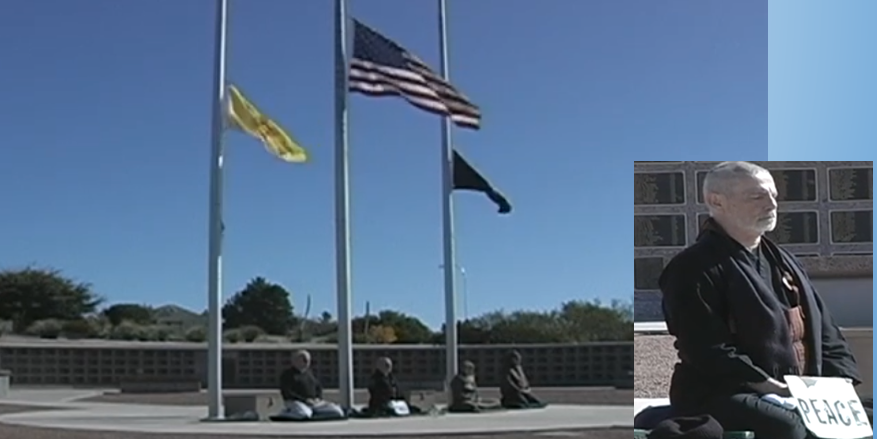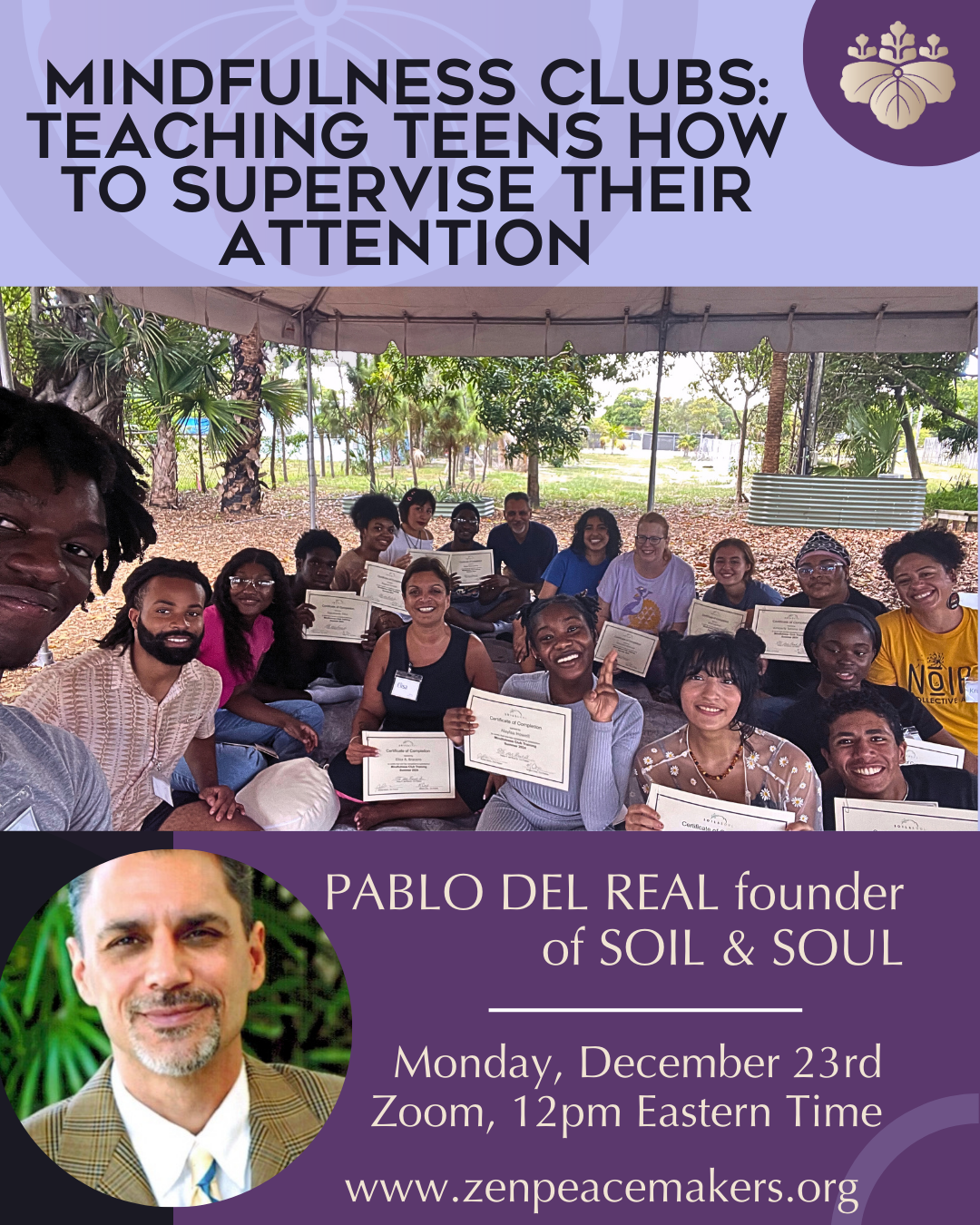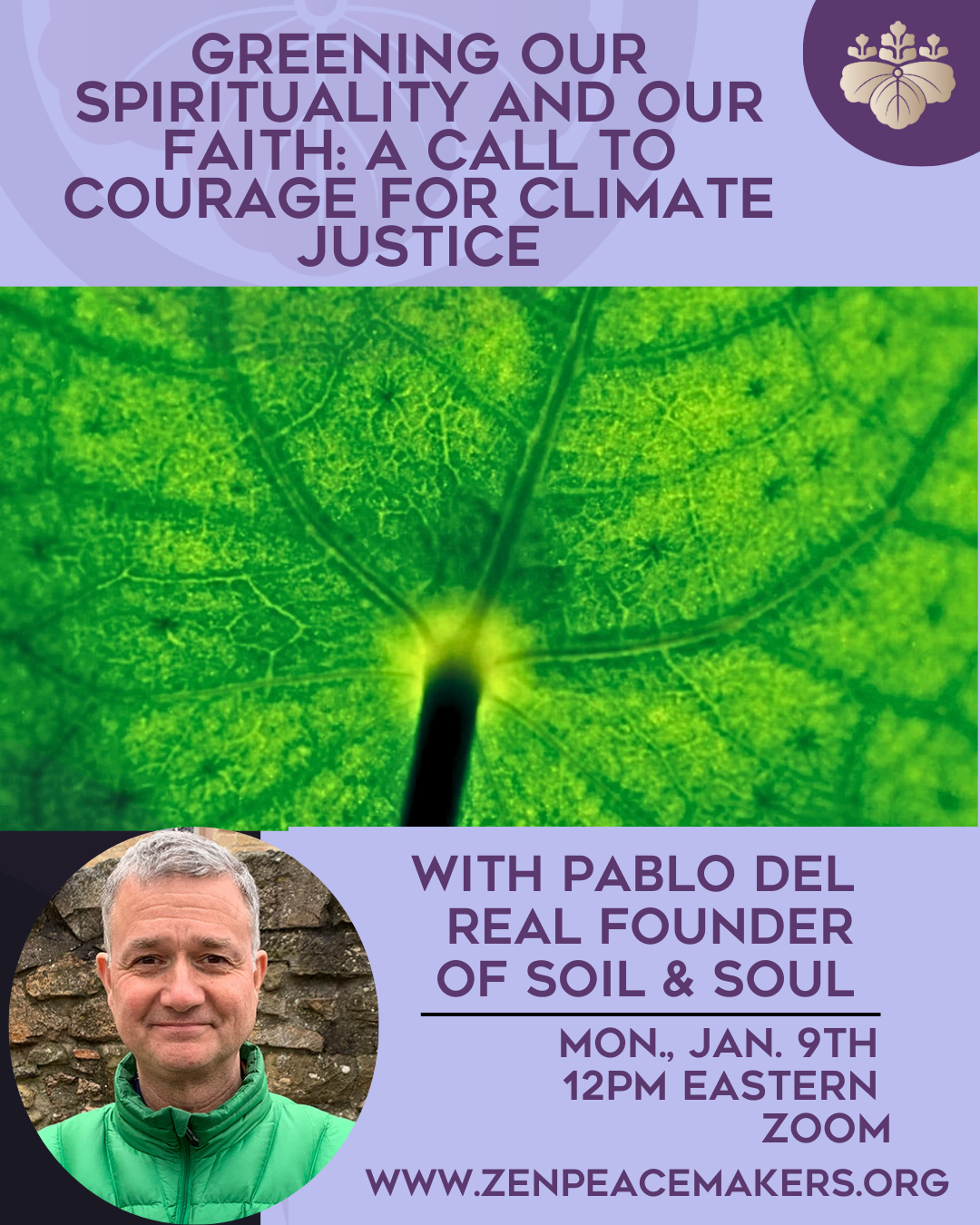By Roshi Harvey Daiho Hilbert
Dressed in the black robes of a Zen priest and looking out from my meditation cushion, my eyes fell on the statue of Buddha in my temple. As a temple monk, I look at that statue several times a day, but in the morning’s light it was different. This morning it was not the temple statue I saw, but the Buddha sitting in an abandoned Temple deep in the jungle of Vietnam. Wet, nearly green with vines, the smile of that Buddha was hard to forget. I was in the middle of a war after all.
Here in Las Cruces, New Mexico, I am eight thousand, four hundred and ten miles away from Pleiku, Vietnam. Five decades later, I still see that smile and feel the emotional craziness I experienced walking past that Buddha while carrying an M-16. I was part of a rifle company heading back to our base camp in Pleiku after a recon mission. It was a different world, and I was a different man.
At that time, just 19 years old on my second enlistment in the Army, I was making the service my career. I had dropped out of high school and enlisted at 17 to become an Infantry soldier. After doing duty in Germany for nearly two years I found myself in Vietnam. It was 1966.
At our Base Camp we were to rest and recover. I was able to get a cup of coffee in the mess tent, throw down my gear, and begin cleaning my rifle, checking ammo pouches and so on. I was tired. We had hiked through some pretty dense jungle, crossed a river, and hacked our way through some very tightly packed bamboo. It had been grueling.
Just as I took a second sip of my coffee the platoon leader gathered us together and told us to get ready for another mission.
“Damn!” I thought, as I gathered my gear and got myself ready.
Apparently, our sister company was in a jam. Surrounded by a battalion of North Vietnamese regulars, they were about to be overrun. We were to go in by chopper to support them. This would be a “hot” landing zone, meaning we would be jumping out of the choppers under fire. I was only in-country a few months and was scared as I climbed on the Huey.
Sitting next to me was my squad leader, a young buck sergeant, I asked him if he was scared. Silly question in retrospect, more about my own need to distract myself from myself. “Yep, I am, this is crap,” he said as a matter of fact, “We just got back and they put us out again!” “Right,” I replied, but didn’t say anything more.
Flying in a Heuy with open doors, legs hanging out, was a thrill, I admit! The country was beautiful; lush, green, and otherwise colorful. I saw rice paddies, crossed a river, then flew over a jungle that gradually became quite thick. Suddenly though, my tourist eyes were abruptly redirected toward our squad leader,
“Lock ‘n load, we’re going in! We’re gonna jump out in saw grass so be prepared!” he screamed over the sounds of chopper blades and motor. Saw grass has sharp, saw-like blades and will cut your arms if you’re not covered.
The chopper banked steeply to the left and suddenly we were looking directly down at the jungle below. Barely holding on to a strap, I nearly slid out the door. Gunfire aimed at us, hit the side of the Huey without too much damage and as it straightened out the nose came up and down we went.
At what appeared to be about ten feet we were directed to jump. Right! I found myself deep in saw grass but was too stoked to realize it was cutting my arms as I ran to find cover without getting shot. No Buddha here.
Bullets and RPG’s were coming from everywhere it seemed to me. The ground was wet, the monsoon season was in full swing, and there seemed to be precious little cover. The enemy was well hidden and in the light of day finding something to shoot at was difficult. The air was thick with the smoke and the smell of rounds being fired. The sounds and smells were overwhelming, not only from gunfire, but from the screams of the wounded and dying too. I don’t really know how I survived those first few hours, but I did.
Then it stopped. The enemy just stopped shooting. I wondered what that was about. True, it was getting dark, but they had the advantage both in number and in camouflage. The silence was only broken by whimpers and quiet orders to set out our Claymores and trip wire flares. I lay in the mud on the jungle floor, rifle pointed out, my eyes scanning for movement. Nothing.
Shortly after our defenses were prepared our company commander sent out a three-man listening post. I admit, I was incredibly happy I wasn’t selected for that job, although I had run point on several missions. These were the jobs of new guys and I guess I was no longer a new guy. So, what I had to do was be ready for the enemy to attack again. I checked my magazines and sipped water from my canteen. I tried to be a church mouse.
Night in the jungle, triple canopy jungle, is very dark. Practically not a star to be seen, just the darkness and the sound of my own breathing. I waited, which was what we did, we waited, waited and wondered when, all the while, swatting quietly at mosquitoes.
I’m not going to lie to you, there was real excitement about being in combat. Something my nineteen-year-old self was eager to do: hunt another human being who was out to kill me. Right, I was no Buddha.
Just about to slip into an unwanted sleep, around midnight I think, everything exploded. Deafening sounds of RPGs, machine guns and rifle fire; the flashes and streams of tracers flowed all around as my heart seemed to jump to keep pace with the machine guns. My breath was quick and shallow. I returned fire with my M-16 on full auto. At the time I could see the source of the enemy machine gun and bore down on his muzzle. I recall someone on the line telling me to slow down. In retrospect I wish I had.
Some really bad things happen in combat. And one of those things happened to me. Shortly after the enemy opened fire, I saw the silhouette of armed soldiers running toward my position. Their rifles at the ready, I assumed they were enemy soldiers attempting to break through our line. I fired at them, I know I hit one, as he fell about twenty meters from my left side. It was then the first of two lifelong nightmares began. I heard him cry for his mother.
What can I say about that experience? I realized I had shot a friend believing him to be an enemy. Yet, there was little time to think about it, the enemy’s fire was relentless. I kept on trying to kill that machine gun. Then, quite suddenly, out of the blue, someone threw a rock and hit my helmet, or so I thought. That’s what it felt like. The difference was I found myself lying on my back in the mud.
Startled, I reached up and touched my head where I thought the rock had hit me. There was a hole there and the thick wetness of blood. I was shot. I felt myself panic. Screamed for a medic and thought right then and there I was going to die. The medic crawled to me under fire and put a compress bandage on my head, then slipped away to aid another wounded soldier.
I was left to myself, feeling pretty much alone in the dark with an enemy hellbent on killing me. My body felt very strange, as if there was water inside my guts rolling this way and that. There was a tingling in my left side. And there was fear, lots of fear. I realized that if I fell asleep, I might not wake up again, so I tried my best to stay awake till morning light.
I listened to my body, I felt it, really felt it, maybe for the first time ever in such an intimate way. I also listened to the soldier I shot. He was crying, he was begging God, he was talking to his mom. And I was listening. It was true horror.
I recall trying to see the stars, feeling the breeze, being truly awake in an effort to stay alive. I thought of my mother and how it might be for her to get the telegram that I had died. I felt the mosquitoes suck my blood. And I heard my own heartbeat. It was not something I’d care to repeat. Yet, I think in retrospect I was more alive and more awake, than I had ever been in my life during those five hours before I could be lifted off on a medevac helicopter at dawn. And when I was lifted off, that’s when my friend died. The irony was the company commander came over to my stretcher and told me how proud he was of my service. He tried to reassure me that I’d be fine. No Buddha here.
The Buddha sitting in front of me was not exactly smiling. Instead, it was the face of a man experiencing serenity, a peace I had spent nearly all of my life since Vietnam attempting to achieve, and at 74, that’s a lot of years. Now a priest and former psychotherapist, my path toward serenity has not been easy, but then one thing I learned in combat was this: life was rarely easy and little of value comes without some type of cost.
After Vietnam, I was placed in a hospital to recover from my wounds. I was on a ward with many, too many other wounded soldiers. It was there that I learned to walk again and to some extent, recovered the use of my left hand. It was also there that I read a book called “The Way of Zen” by a fellow named Alan Watts. I also began using karate, an art I learned in Germany, to help me in my recovery. This all felt right, the Asian way of looking at things. Their focus on compassion, a wider picture, and the practices of training their minds. In spite of the moral and psychological anguish I experienced, I had a powerful sense I was going to live. The vague and somewhat cloudy prognostications of my doctors? I didn’t listen to them. However, I was quite an angry young man, quite unsettled, and felt challenged by the simplest things.
After being “retired” from the Army I settled back in my hometown, Miami Florida. It was there that I met my friend Bernie. Bernie cut me no slack. He taught me to play chess, introduced me to American literature and philosophy, and generally gut punched my heart into listening. He would literally barge into my apartment, screaming, “Hilbert, have you studied your game of chess today?” this at 7:00 AM.
From “wore-torn soldier,” a phrase he used to describe me, who spent hours in the night in Royal Castle restaurants waiting for morning light, I went from high school drop out to PhD. All the while being emotionally supported by Bernie, and, of course, an untrained and sporadic practice of Zen meditation. I went through women and jobs as if there was no tomorrow, but gradually learned to love again with the help of my loving and compassionate wife. Helping other trauma survivors forced me to examine my own experience, not the easiest of things to do.
The Buddha in the Temple I now administer speaks to me every morning and evening. He whispers. I listen. He shouts. I listen. He cries. I cry. He smiles. I smile. And in the shadows, I hear the screams of the dead and wounded. Not just of Vietnam War vets, but those victims of today’s seemingly endless wars, as well. It seems to me we Vietnam veterans failed. We should have been on the front lines of protests against the invasion of Iraq and the continuing war in Afghanistan. Yet, in forgiving myself there are moments in my meditation hall where, in the shadows, I feel the heart of wisdom making its way out, a way that only comes when we are awake to feel it. There is no Buddha, but the Buddha within.
About the author:
Rev. Dr. Harvey Daiho Hibert, Roshi is an ordained Soto Zen priest and the founding abbot of the Order of Clear Mind Zen and a leader of the Zen community in southern New Mexico. Daiho Roshi received Shukke Tokudo in the year 2000 and received Dharma Transmission in 2005. He began studying Zen in 1966 after being shot in the head in combat in Vietnam. He was featured in a documentary on Vietnam Veterans that aired on both National Public Radio and PBS station KRWG-TV. You can also learn more about his story on the Story Corps page, as well as his YouTube Channel. He is also an accomplished painter, teacher, and psychotherapist. His website is http://daihozen.blogspot.com and his artwork can be seen on http://daihozenart.blogspot.com. In addition, Roshi Daiho is a prolific writer. His latest publications include: The Zen of Trauma: When Bad Things Happen (2020), Shingi: Standards for the Order of Clear Mind Zen (2020), and Infinite Ku: Everyday is Everything (2020).




